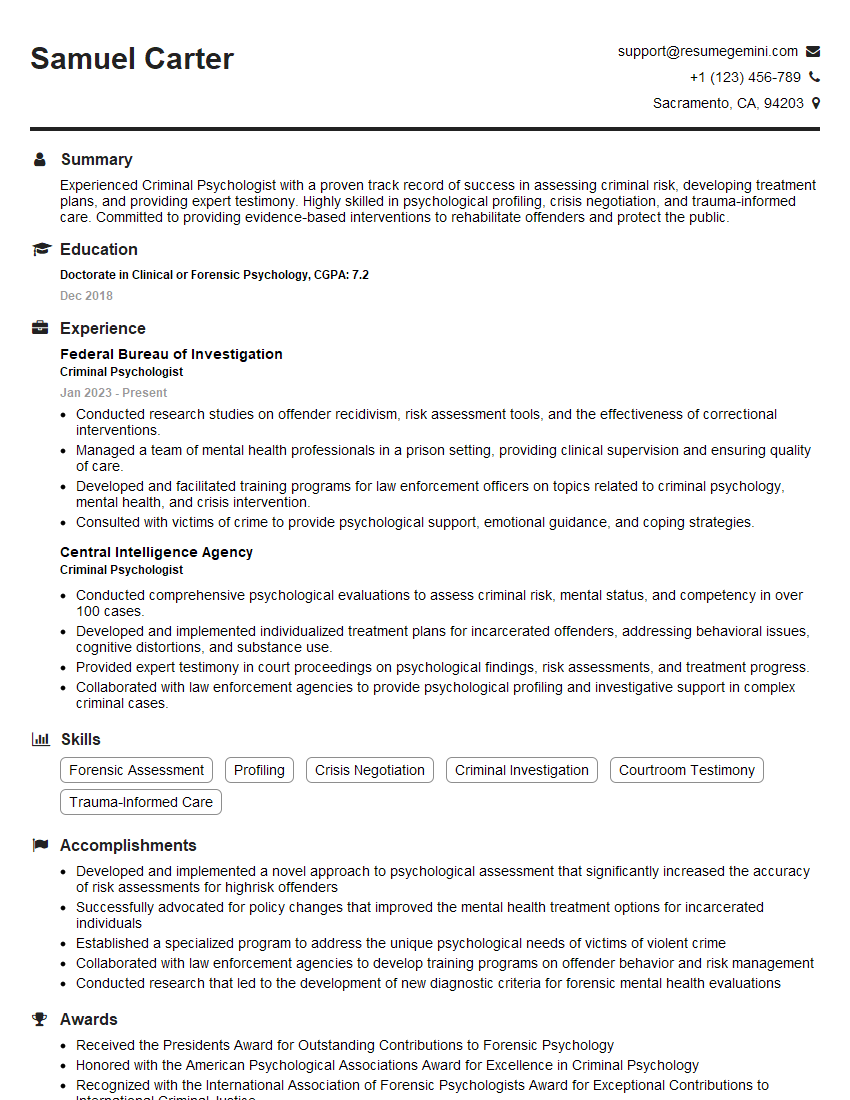Are you a seasoned Criminal Psychologist seeking a new career path? Discover our professionally built Criminal Psychologist Resume Template. This time-saving tool provides a solid foundation for your job search. Simply click “Edit Resume” to customize it with your unique experiences and achievements. Customize fonts and colors to match your personal style and increase your chances of landing your dream job. Explore more Resume Templates for additional options.

Samuel Carter
Criminal Psychologist
Summary
Experienced Criminal Psychologist with a proven track record of success in assessing criminal risk, developing treatment plans, and providing expert testimony. Highly skilled in psychological profiling, crisis negotiation, and trauma-informed care. Committed to providing evidence-based interventions to rehabilitate offenders and protect the public.
Education
Doctorate in Clinical or Forensic Psychology
December 2018
Skills
- Forensic Assessment
- Profiling
- Crisis Negotiation
- Criminal Investigation
- Courtroom Testimony
- Trauma-Informed Care
Work Experience
Criminal Psychologist
- Conducted research studies on offender recidivism, risk assessment tools, and the effectiveness of correctional interventions.
- Managed a team of mental health professionals in a prison setting, providing clinical supervision and ensuring quality of care.
- Developed and facilitated training programs for law enforcement officers on topics related to criminal psychology, mental health, and crisis intervention.
- Consulted with victims of crime to provide psychological support, emotional guidance, and coping strategies.
Criminal Psychologist
- Conducted comprehensive psychological evaluations to assess criminal risk, mental status, and competency in over 100 cases.
- Developed and implemented individualized treatment plans for incarcerated offenders, addressing behavioral issues, cognitive distortions, and substance use.
- Provided expert testimony in court proceedings on psychological findings, risk assessments, and treatment progress.
- Collaborated with law enforcement agencies to provide psychological profiling and investigative support in complex criminal cases.
Accomplishments
- Developed and implemented a novel approach to psychological assessment that significantly increased the accuracy of risk assessments for highrisk offenders
- Successfully advocated for policy changes that improved the mental health treatment options for incarcerated individuals
- Established a specialized program to address the unique psychological needs of victims of violent crime
- Collaborated with law enforcement agencies to develop training programs on offender behavior and risk management
- Conducted research that led to the development of new diagnostic criteria for forensic mental health evaluations
Awards
- Received the Presidents Award for Outstanding Contributions to Forensic Psychology
- Honored with the American Psychological Associations Award for Excellence in Criminal Psychology
- Recognized with the International Association of Forensic Psychologists Award for Exceptional Contributions to International Criminal Justice
- Awarded the National Association of Criminal Defense Lawyers Award for Outstanding Service to Criminal Justice
Certificates
- American Board of Criminal Psychology (ABCC)
- International Association of Forensic and Correctional Psychology (IAFCP)
- Academy of Criminal Justice Sciences (ACJS)
- National Council on Crime and Delinquency (NCCD)
Career Expert Tips:
- Select the ideal resume template to showcase your professional experience effectively.
- Master the art of resume writing to highlight your unique qualifications and achievements.
- Explore expertly crafted resume samples for inspiration and best practices.
- Build your best resume for free this new year with ResumeGemini. Enjoy exclusive discounts on ATS optimized resume templates.
How To Write Resume For Criminal Psychologist
- Quantify your accomplishments with specific metrics and data whenever possible.
- Use strong action verbs to describe your skills and experience.
- Highlight your research and publication experience, if any.
- Tailor your resume to each job you apply for, highlighting the skills and experience that are most relevant to the position.
- Proofread your resume carefully before submitting it, paying attention to grammar, spelling, and formatting.
Essential Experience Highlights for a Strong Criminal Psychologist Resume
- Conduct comprehensive psychological evaluations to assess criminal risk, mental status, and competency.
- Develop and implement individualized treatment plans for incarcerated offenders, addressing behavioral issues, cognitive distortions, and substance use.
- Provide expert testimony in court proceedings on psychological findings, risk assessments, and treatment progress.
- Collaborate with law enforcement agencies to provide psychological profiling and investigative support in complex criminal cases.
- Conduct research studies on offender recidivism, risk assessment tools, and the effectiveness of correctional interventions.
- Manage a team of mental health professionals in a prison setting, providing clinical supervision and ensuring quality of care.
Frequently Asked Questions (FAQ’s) For Criminal Psychologist
What is the role of a criminal psychologist?
Criminal psychologists work with law enforcement agencies, courts, and correctional facilities to understand and assess the psychological factors that contribute to criminal behavior. They use their knowledge of psychology and criminology to develop risk assessments, treatment plans, and prevention strategies.
What are the educational requirements for becoming a criminal psychologist?
Most criminal psychologists have a doctorate in clinical or forensic psychology. Some may also have a master’s degree in psychology, criminology, or a related field.
What are the career prospects for criminal psychologists?
Criminal psychologists are in high demand in a variety of settings, including law enforcement, corrections, and private practice. They can work as consultants, researchers, or clinicians.
What are the challenges of working as a criminal psychologist?
Working as a criminal psychologist can be challenging due to the nature of the work. Criminal psychologists often work with individuals who have committed serious crimes, and they may be exposed to violence and trauma.
What are the rewards of working as a criminal psychologist?
Working as a criminal psychologist can be rewarding because it allows you to make a difference in the lives of others. Criminal psychologists can help to rehabilitate offenders, reduce crime, and protect the public.
How can I become a criminal psychologist?
To become a criminal psychologist, you will need to earn a doctorate in clinical or forensic psychology. You will also need to complete an internship and post-doctoral fellowship in the field.